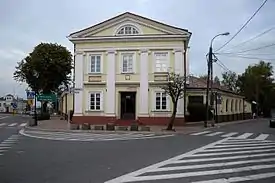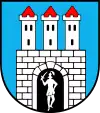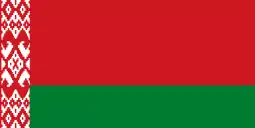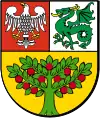Grójec
Grójec [ˈɡrujɛt͡s] is a town in Poland. Located in the Masovian Voivodeship, about 40 kilometres (25 miles) south of Warsaw. It is the capital of urban-rural gmina Grójec and Grójec County. It has 16,674 inhabitants (2017).[1] Grójec surroundings are considered to be the biggest apple-growing area of Poland. It is said that the region makes up also for the biggest apple orchard of Europe. Statistically, every third apple sold in Poland is grown in Grójec – a unique local microclimate provides for their beautiful red colour.[2]
Grójec | |
|---|---|
 Town centre with historical architecture | |
 Coat of arms | |
 Grójec | |
| Coordinates: 51°51′56″N 20°52′3″E | |
| Country | |
| Voivodeship | Masovian |
| County | Grójec County |
| Gmina | Gmina Grójec |
| Established | 11th century |
| Town rights | 1419 |
| Government | |
| • Mayor | Dariusz Gwiazda |
| Area | |
| • Total | 8.52 km2 (3.29 sq mi) |
| Elevation | 153 m (502 ft) |
| Population (2017) | |
| • Total | 16,674 |
| • Density | 2,000/km2 (5,100/sq mi) |
| Time zone | UTC+1 (CET) |
| • Summer (DST) | UTC+2 (CEST) |
| Postal code | 05-600 |
| Area code(s) | +48 48 |
| Car plates | WGR |
| Website | http://www.grojecmiasto.pl/ |
World War II
In November 1940, during the Nazi Occupation of Poland, German authorities established a Jewish ghetto in Grójec,[3] in order to confine its Jewish population for the purpose of persecution and exploitation. The ghetto was liquidated in February 1941,[3] when almost all of its inhabitants (5,200–6,000) were transported in cattle trucks to Warsaw Ghetto, the largest ghetto in all of Nazi occupied Europe with over 400,000 Jews crammed into an area of 1.3 square miles (3.4 km2). From there, most inmates were sent to Treblinka extermination camp.[4][5][6][7] Only a group of Jewish craftsmen was left in Grójec, however, they were also annihilated in a mass execution in Dębówka, near Góra Kalwaria.
Notable people
- Piotr Skarga - a Polish Jesuit
- Jan Jagmin-Sadowski - general of the Polish Army
- Marek Suski - a Polish politician
- Justyna Kozdryk - a Polish powerlifter
- Bartłomiej Niedziela - a Polish footballer
International relations
Twin towns – Sister cities
Grójec is twinned with:
 Spišská Nová Ves, Slovakia
Spišská Nová Ves, Slovakia Strumica, North Macedonia
Strumica, North Macedonia Canosa di Puglia, Italy
Canosa di Puglia, Italy Horki, Belarus
Horki, Belarus
See also
Notes and references
- "Grójec (mazowieckie) » mapy, nieruchomości, GUS, noclegi, szkoły, atrakcje, kody pocztowe, bezrobocie, wynagrodzenie, zarobki, tabele, edukacja, przedszkola, demografia, zabytki". Polska w liczbach (in Polish). Retrieved 2018-08-17.
- Michał Mackiewicz, "Okolice Grójca." Mazowiecki Urząd Wojewódzki w Warszawie. (in Polish)
- "Getto w Grójcu | Virtual Shtetl". sztetl.org.pl. Retrieved 2018-08-17.
- Warsaw Ghetto, United States Holocaust Memorial Museum (USHMM), Washington, D.C.
- Richard C. Lukas, Out of the Inferno: Poles Remember the Holocaust, University Press of Kentucky 1989 - 201 pages. Page 13; also in Richard C. Lukas, The Forgotten Holocaust: The Poles Under German Occupation, 1939-1944, University Press of Kentucky, 1986, Google Print, p.13.
- Gunnar S. Paulsson, "The Rescue of Jews by Non-Jews in Nazi-Occupied Poland," Journal of Holocaust Education, Vol.7, Nos.1&2, 1998, pp.19-44. Published by Frank Cass, London.
- Edward Victor, "Ghettos and Other Jewish Communities." Archived 2011-06-08 at the Wayback Machine Judaica Philatelic. Accessed June 20, 2011.
- Grójec city government webpage
- Jewish Community in Grójec on Virtual Shtetl
